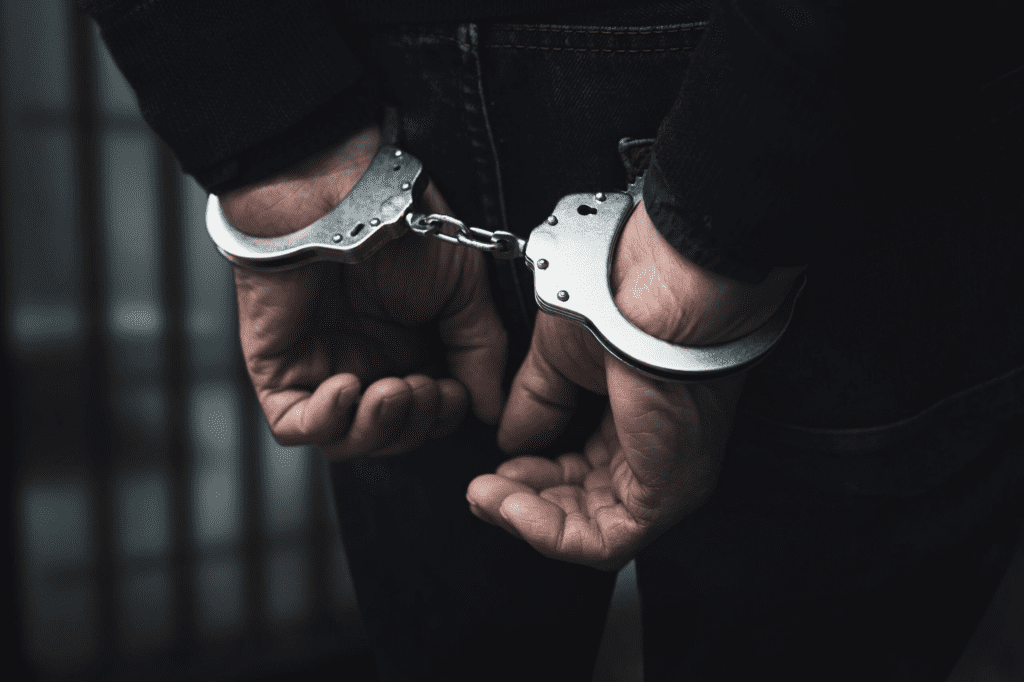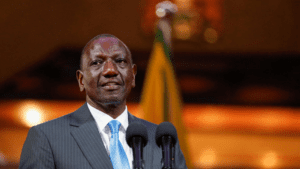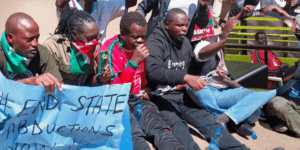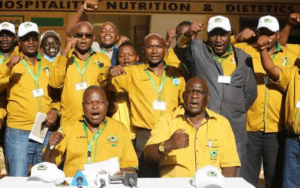
- Seven hotel employees arrested in Homa Bay over the death of a university student.
- Victim identified as Paul Sunday, a 25-year-old final-year Criminology student at Tom Mboya University.
- Allegations of assault following claims of property destruction by the student.
- Victim reportedly exhibited erratic behavior before the incident, including smashing a TV at the hotel.
The quiet town of Homa Bay has been thrust into the spotlight following the tragic death of Paul Sunday, a 25-year-old Criminology student at Tom Mboya University. This incident, which has led to the arrest of seven hotel employees, raises critical questions about human rights, law enforcement, and the treatment of individuals experiencing mental health crises.
A Promising Life Cut Short
Paul Sunday was in the final stages of his university education, a momentous achievement that his family eagerly awaited. Described as the family’s beacon of hope, his untimely death has left a void that no words can fill. According to his brother, Daniel Baraza, Paul was a bright and determined individual who had his sights set on a brighter future. The circumstances surrounding his demise have left his family in anguish, demanding answers and justice.
The Unfolding Tragedy
The series of events that led to Paul’s death began on a Saturday afternoon when he was seen behaving erratically in Homa Bay town. Witnesses reported that he appeared naked in public, alarming residents. The behavior escalated when he entered a supermarket in Sofia Estate, took a tin of margarine without paying, and later disrupted operations at a local petrol station.
His final stop was at Dalawa Hotel and Restaurant, where the situation took a grim turn. Reports indicate that Paul smashed a television set at the hotel, prompting the staff to intervene. This intervention, however, allegedly escalated into a brutal assault that ultimately cost him his life.
Allegations of Torture and Neglect
Eyewitness accounts and police reports paint a disturbing picture of what transpired at the hotel. Paul was reportedly tied up with ropes and tethered to a metal grill at the reception area after being subdued by the hotel staff. His injuries were severe, and he was bleeding profusely when police arrived at the scene. Despite being taken to the hospital, Paul succumbed to his injuries while receiving medical attention.
Arujo Location Chief Bob Lango confirmed that the student had caused a disturbance before the incident, but the manner in which the hotel staff handled the situation has been widely criticized. The family and the local community are calling for accountability, arguing that the staff’s actions were excessive and inhumane.
Arrests and Ongoing Investigations
Following Paul’s death, seven individuals, including four men and three women employed at the hotel, were arrested. Among them is a security guard who was allegedly involved in restraining the student. Homa Bay County Police Commander Hassan Barua stated that the suspects are assisting law enforcement in piecing together the events that led to the tragedy.
The Directorate of Criminal Investigation (DCI) is also involved, focusing on uncovering Paul’s last movements and retrieving his personal belongings, including his clothes. Investigators are working to establish whether the suspects’ actions constituted torture and whether their intervention was justified or an act of unchecked aggression.
Community Outrage and Demands for Justice
The incident has sparked outrage among students at Tom Mboya University and the broader community. Fellow students, led by student leader Lawrence Onyango, have called for justice, emphasizing that Paul’s death was both brutal and unnecessary. They have urged law enforcement to ensure that the suspects face the full force of the law.
“The way our colleague died was horrific. This should never happen to anyone else. We demand that those responsible be held accountable,” said Onyango.
The students also demanded the temporary closure of Dalawa Hotel and Restaurant to preserve evidence and prevent interference with the ongoing investigation. This move, they argue, is crucial in ensuring a fair and transparent process.
Mental Health and Public Perception
One of the most concerning aspects of this tragedy is the apparent lack of understanding and compassion for mental health issues. Some locals claimed that Paul exhibited signs of mental distress, yet the response from those around him was punitive rather than supportive. This highlights a broader societal issue where mental health crises are often met with stigma and neglect instead of appropriate care.
Experts emphasize the need for public education on mental health to prevent such incidents in the future. Situations like Paul’s require professional intervention and a humane approach, not violence or detention.
Family’s Agony and Plea for Accountability
For Paul’s family, the pain of losing a loved one is compounded by the circumstances of his death. His brother, Daniel Baraza, expressed disbelief at the allegations of mental illness, stating that Paul had shown no prior signs of distress. He questioned why the hotel staff chose to take matters into their own hands rather than involving authorities immediately.
“He was unarmed. They should have detained him and called the police. What they did was beyond comprehension,” Baraza lamented.
The family has vowed to pursue justice relentlessly, urging the government and law enforcement to take decisive action against the suspects.
A Call for Systemic Change
This tragedy underscores the urgent need for systemic change in how such situations are handled. Law enforcement agencies and private establishments must receive training on de-escalation techniques and the humane treatment of individuals in distress. Additionally, there is a pressing need for community awareness programs to destigmatize mental health issues and promote a culture of empathy and understanding.Conclusion
Paul Sunday’s death is a stark reminder of the consequences of ignorance and brutality. As investigations continue, the focus must remain on delivering justice and ensuring that such an incident is never repeated. For his family, friends, and the community of Tom Mboya University, Paul’s memory must serve as a catalyst for change—a change that prioritizes humanity, justice, and the protection of vulnerable individuals.
This incident has ignited a broader conversation about the value of life and the responsibilities we share as a society. As Homa Bay comes to terms with this tragedy, it is imperative that we all reflect on our roles in fostering a safer, more compassionate world.


